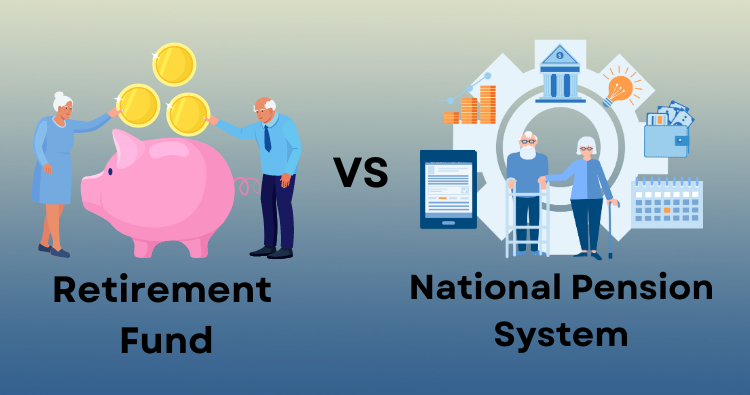- +91 9898200242
-


Retirement Mutual Fund Vs NPS: Which one is better for you?
After retirement, life offers fresh experiences. It is time you start enjoying your life stress-free. But it can only happen if you have sufficient funds, as working in old age seems a little overwhelming. If you plan your retirement well during your working years, you will worry less and enjoy more.
Currently, different investment options can help you to plan for your retirement. But in this article, we will look at the two investment options: Retirement Fund and National Pension System.
What is a retirement mutual fund?
A retirement mutual fund is a solution-oriented mutual fund that aims to help people plan for their retirement. Typically, these funds invest in a mix of assets such as equities and debt. These funds come with three plans with different asset allocations. The aggressive plan has a higher equity exposure and is more suited for young investors. On the other hand, the conservative plan has the lowest equity exposure for investors close to their retirement.
Advantages of retirement funds:
The lock-in period of five years or until retirement age (whichever comes first) can assist you in staying focused on your retirement plan.
You can take advantage of automatic rebalancing of your portfolio by switching between different plans.
It takes into account the changing risk tolerance levels and fluctuating levels of comfort that investors have with risk
What is NPS?
The National Pension System(NPS) is a scheme launched by the government of India to benefit employees in the public/private sector, including the ones in the unorganized sector. Individuals can contribute a minimum of Rs.6000 per annum in one go or Rs.500 every month.
The scheme matures at 60 years of the subscribers and may be extended to no more than 70 years. In specific situations, subscribers can withdraw up to 25% of the money invested after three years of opening an NPS account.
Benefits of NPS:
Comes with tax-deduction benefits
Government-backed scheme
Ease of access
Retirement fund Vs NPS
Though the objectives of both schemes may be similar, they have basic differences. Let’s discuss them.
Equity Exposure
In the case of retirement funds, the equity exposure of the aggressive plan of the fund is the highest. The maximum equity allocation of these plans depends on the respective fund house. So, there is no mandated maximum equity exposure.
However, in the case of NPS, the maximum equity exposure permitted is 75% up to 50 years under the active choice.
Investment plans:
Retirement funds come with three plans. Investors can choose the plan that best suits them, and the fund manager takes the investment decisions.
While in NPS, you have two choices: auto choice and active choice. In auto choice, a manager is appointed to take care of your investments, while in active choice, you’re free to choose different types of investments as per your requirements.
Taxation
Currently, there are no tax benefits for investing in a retirement mutual fund.
However, in the case of NPS, investments up to Rs.1.5 lakhs come under section 80C. In addition, an additional amount of Rs 50,000 is exempted. This means that a total of Rs 2,00,000 per year is exempted from tax under NPS. The NPS falls under two sections: 80CCD (1) and 80CCD (1B).
However, after retirement, the income from annuities is applicable to tax.
Withdrawals
Investors can redeem their investments after five years or when they turn 60. However, withdrawal from NPS is only allowed under special circumstances. Under regular circumstances, when a subscriber becomes 60 or reaches the age of superannuation, they must spend at least 40% of the total pension fund to buy an annuity that would pay a regular monthly income. The remaining money is available for lump sum withdrawal.
Which is a better option: retirement funds or NPS?
When it comes to investments, you must remember that no investment is right or wrong. Any investment that aligns with your financial goals is perfect for you. If you have pre-set retirement goals like traveling the world, retirement funds may be an ideal option for you. For example, you can invest in equity instruments that would generate relatively higher returns but do not forget they come with a little high risk too. NPS may be ideal for individuals who want a fixed monthly income after retirement.
However, it is best to consult a financial expert while making long-term financial decisions.




At WealthKare, we believe true wealth is not just about making money—it’s about managing it to bring freedom, peace, and joy into your life. Many people struggle financially, not due to a lack of effort, but because they weren’t taught how to manage their money. Our mission is to help families break free from financial stress and equip them with the tools and knowledge to build lasting financial security.
Corporate Office
A 506 Ratnakar Nine Square,
Keshavbaug, Vastrapur, Ahmedabad
Registered Office
First Floor, FF 3, Rajshri Avenue,
Shahibaug Dafnala Road, B/h Vasant Vihar
Tower, Ahmedabad, Gujarat, 380004
+91 9898200242
Copyright © wealthkare. All rights reserved. |